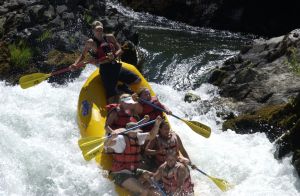Experience is simply the name we give our mistakes. –Oscar Wilde
When it comes to whitewater rafting, there are many forgivable mistakes which would help you become a better rafter overall. Without mistakes or trial-and-error, we would not be able to learn how to progress forward in any endeavor, but not all mistakes are worth making and some are more costly than they are rewarding on the river. Before taking your next Huckleberry Finn rafting adventure, be sure you know these costly mistakes to avoid while on the water, because remember, a river can rage and, if you are not prepared, you may well feel its cold, wet wrath.
Know Your Rafting Group Dynamics
A chain is only as strong as its weakest link, so when assembling your rafting group, keep in mind experience level and overall rafting knowledge. Even a single inexperienced person could spell disaster for a trip, regardless of the strength of the remaining group members. Take the time to educate everybody on rafting safety and rules so that you are all on the same page.
Beyond individual skill and knowledge levels, has your group worked rafted together before? If not, have they ever worked together in any sort of group effort?
You may have a group of great friends who all get along well together but that certainly does not mean they work well together. Even a group of experienced rafters may have a hard time synchronizing, and when rafting in rough white waters, synchronization is an absolute must. Group dynamics are difficult to foresee so avoid disastrous rafting situations by clearly communicating with each other.
Equipment and Safety Checklist
Create a list of things to bring on your trip and collaborate with your group members. Nothing’s worse than getting on the river and realizing you forgot important items and gear. Also, make sure your equipment is functional and that you’ve created a safety checklist to ensure everything is covered including:
- Raft
- Paddles
- Helmets
- Rope
- Life Jackets
- Wet Suits
- Neoprene Socks
- Change of Clothing
- Survival Gear
- Fire Starters
- Knife
- First Aid Kit
- Inhalers
- Insulin Shots
- Blister Treatments
- Sunscreen
- Bug Spray
- Food & Water
Know the River You’re Rafting and Respect It
Even if you’ve seen the river you intend to raft or have been in parts of it before, it does not mean you actually know the river as they change frequently every year, throughout the season, and depending on total rainfall. Knowledge is power, without it you are weak, and the river won’t go easy on you because you simply didn’t know better.
Look at the rivers difficulty rating. You can check them out online, referring to books, and speaking with local rafters to learn as much as possible about it.
Once you understand the difficulty of your chosen river, map your exact path out and daily distance goals. Rivers often turn and wind in odd ways and if you are not careful you can easily take a wrong turn. Learn all of the hazards to avoid at every section and whether they are obstacles, drops, ledges, rough waters, or waves, so you can know every dangerous part of the river.
On that note, before attempting to hit certain dangerous sections, consider beaching the raft and scout out the section before entering it. Any number of things may have changed from when whatever you read was written, or whatever you were told was experienced. Between rock falls, mud slides, fallen trees, higher or lower water levels, and other debris, there are countless reasons you should scout certain sections beforehand. Even if everything appears as you imagined, it’s still a great safeguard to avoid trouble.
Raft Only When Mentally and Physically Prepared
The biggest mistake a person can make is thinking they are prepared when they actually are not. Confidence and ego cloud our judgment more than any other things in this world. First and foremost, you should never go whitewater rafting while intoxicated, no beer, no liquor, no pot or dope. Clear eyes and clear minds are absolutely necessary.
You should also avoid rafting when you’re sick. No doubt you may want to take medicine to feel better, but neither your mind nor your body will function as well as it could be. This simply makes you the weak link in the chain. Not to mention that medicine is a drug, so rafting while sick should be avoided overall.
If you are mentally tired from a lack of sleep or long day, your brain may be slowed down just as much if you were drunk. The last thing you want to lose on the river is your ability for sound judgment and logical thinking, so rest up properly beforehand and make sure you feel energized and ready. Get a full night’s rest to avoid physical fatigue too. You may think paddling is easy but when you need to give 100% of your strength in a moment’s notice, having only 70% available is not enough to suffice.
Know Your Limits: Bravery isn’t a substitute for Caution
Finally, don’t follow the adage, “Go big or go home!” Viewing any river on the banks of the shore may make it seem timid or navigable but it’s an entirely different world when you’re actually in the belly of the beast. Understand exactly what your group can safely raft and underestimate rather than over. When dealing with nature and its elements, it’s always better to err on the side of caution.
Hopefully this article highlighted a few areas which will help to keep your next rafting adventure safer overall. The only last word of advice worth giving is to stay frosty out there! Attention to detail may well be your best aid on the river… you just have to know the details to pay attention to.
The author of this article is Damien Wilhelmi. I write for inaraft.com, a guided white water rafting service located in Colorado. If you enjoyed this piece you can follow me on Twitter @CustParadigm.


















Be First to Comment